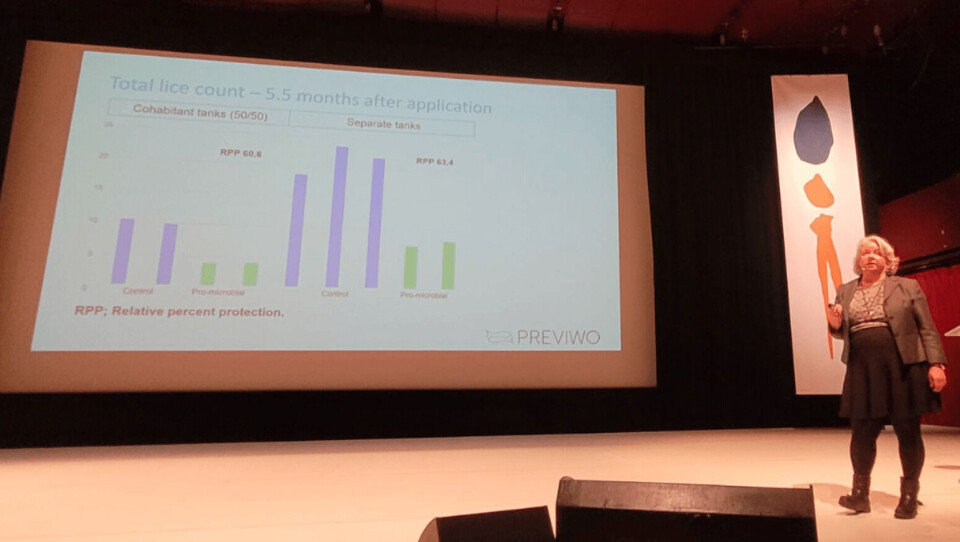
Probiotic significantly reduces fixation of lice on salmon
A probiotic administered to salmon by bath treatment before the fish are transferred to sea has been shown to reduce the impact of lice in the following months.
Stembiont, composed of benign strains of Aliivibrio bacteria, has delivered good results both in the laboratory and in the field, demonstrating effects on copepodite fixation and impacting the ability of lice to reach maturity and develop egg strings.
The development of the probiotic by Norwegian company Previwo is based on the theory that bacteria of the Aliivibrio genus are very prevalent and abundant in the marine environment, and many of the species have evolved together with aquatic animals in a kind of symbiosis.
Long-lasting effects
Speaking at the recent Sealice Conference 2022, held in Torshavn in the Faroes, Previwo chief executive Kira Salonius explained that the Aliivibrio genus of bacteria is the fifth most prevalent in the water. From healthy salmon, benign Aliivibrio strains were isolated, characterised and investigated for possible probiotic effect in Atlantic salmon.
As the scientists saw that the product administered via bath had the ability to increase the quality of the salmon skin in terms of the number of mucous cells and the production of mucus, they wondered if this fact would be relevant against sea lice.
The first laboratory results in an in vivo experiment demonstrated a significant reduction in the fixation of Lepeophtheirus salmonis copepodites of 60-65% in the face of a challenge performed 5.5 months after fish were bathed with Stembiont. A second experiment showed a 73% reduction in the fixation of copepodites in the face of a challenge carried out 8.5 months after the application of the product.
Quickly incorporated
“Stembiont can be administered along with sedation when fish are grouped together for vaccination, for example, and bacteria are incorporated very quickly through the skin and gills,” Salonius explained.
The Previwo boss also announced the effects on the following generations of lice after being exposed to the product. “In fish exposed to Aliivibrio spp. either directly or by cohabitation [with treated fish], less than 5% of the lice matured beyond the chalimus stages, and the egg strings appeared underdeveloped at the time of counting, while 88% of the lice in untreated fish had fully matured.”
“We have plans to apply for registration in all relevant geographies with significant intensive salmon aquaculture,” Salonius told Fish Farming Expert.
The effect on the lice’s offspring, whether it was a slower overall development or a developmental impairment, was that the hatching success of the egg strings was reduced by more than 90%.
“In summary, a reduction in lice fixation was observed in the probiotic-exposed group with only one administration of the product,” said Salonius, an experienced biotechnology executive with a science background.
“This was consistent and reproducible, showing a Relative Percentage of Protection (RPP) greater than 60%. In addition, there is evidence of a prolonged protective effect in time of up to 8.5 months, a reduction in the viability and success of hatching of the eggs.”
Field tests
With the product commercially registered in 2020, the company began field testing in conjunction with Norwegian salmon farmers. Following 4.73 million treated fish in 19 Norwegian sites for 12 months, the results show a 45-53% reduction in L. salmonis infestation, mainly in the adult stages.
Also, when comparing the difference in lice numbers for seven sites with Stembiont with the previous generation without Stembiont, the treated sites had on average 24% fewer adult females and 7% fewer mobile adults. At the same time, 14 neighbouring sites with the same stocking period experienced an increase of 26-29% on average, which shows a significant difference for the Stembiont sites in space and time.
Previwo’s current markets for Stembiont are Norway and Faroes but it intends to extend the product’s reach.
“We have plans to apply for registration in all relevant geographies with significant intensive salmon aquaculture,” Salonius told Fish Farming Expert.























































